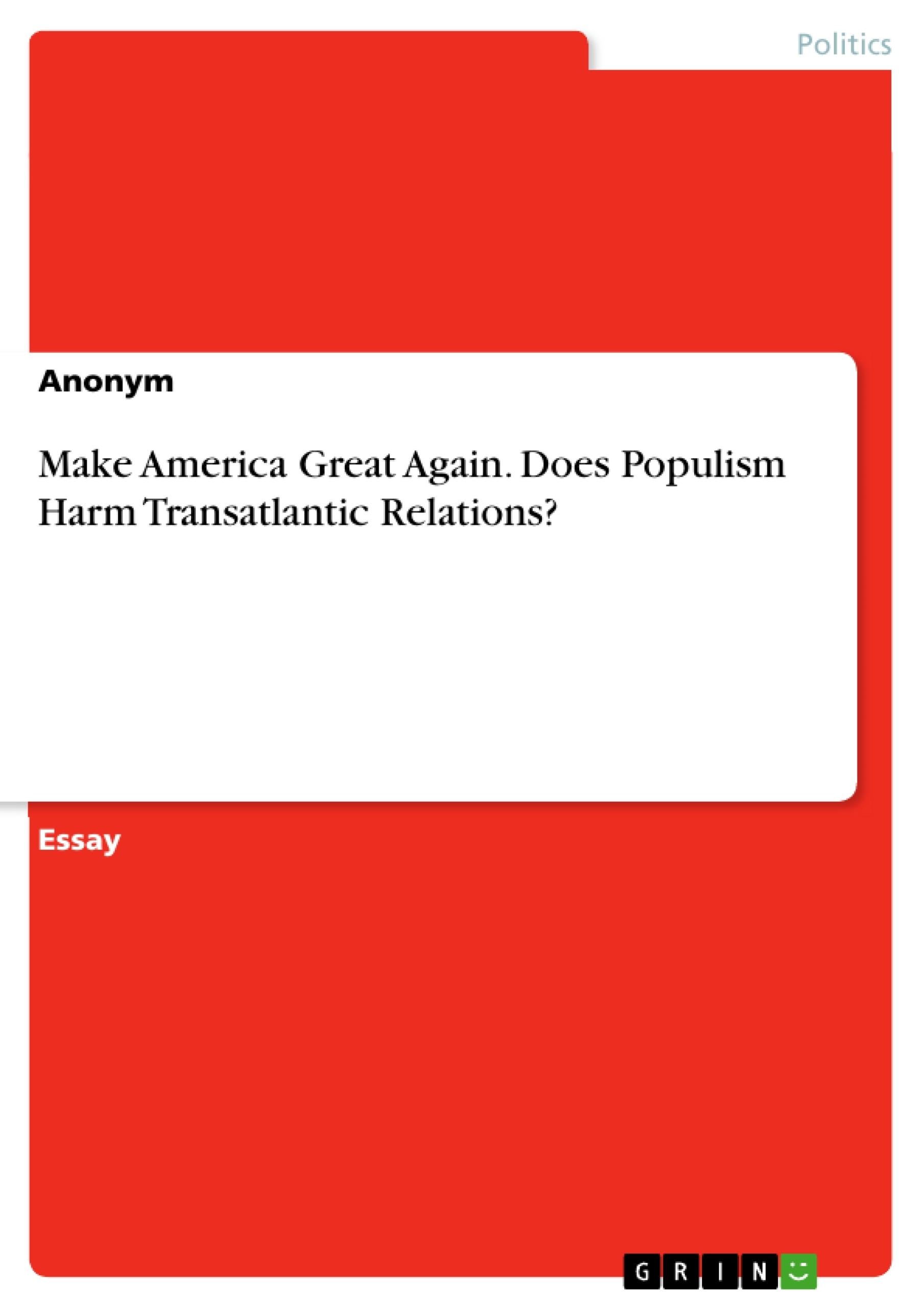This paper tries to answer the question, if populism does harm the Transatlantic Relations. In order to do so, it first sets out to give a quick definition of the term itself, before its attention to the rise of populism in European states. In a third step, economic impacts, such as the sanctions against Iran, are put against the backdrop of the aforementioned rise of populism. Finally, a quick overview over the findings concludes the essay.
Populism has a long-lasting history and was already observed under Julius Caesar in the Roman Empire. It did not become a widespread phenomenon and familiar term until the 1890s, when in America the first agrarian movements started, through which later the People’s party developed.
Until now, there is no single definition provided for the term populism. Scholars from the London School of Economics define populism as any of the following three:
1. The frustration over declines in the status of welfare
2. A nationalist nostalgia
3. A political strategy in which a charismatic leader appeals to the masses while sweeping aside institutions
The Economist sates that most influential definition was introduced in 2004 by Mudde. In the Economist, Muddes defined the term populism as an ideology that establishes an ideological framework of the pure people versus a corrupt elite. Mudde demands that politics should be an expression of the volonté general. Furthermore, a distinction between exclusive and inclusive populism has to be made. Exclusive populism describes the phenomenon of shutting out stigmatised groups, and is mainly found in Europe and North America. Whereas inclusive populism demands that politics be opened up to stigmatised groups and is mainly represented in Latin America.
In the paper, the term populism always refers to Muddes definitions of populism as an ideological framework.
Inhaltsverzeichnis (Table of Contents)
- Definition Populism
- Populism in America
- Impacts of Populism on Transatlantic Relations from a political perspective
- NATO
- Rise of Populism in Europe
- Impacts of Populism on Transatlantic Relations from an economic perspective
- Iran Sanctions
- Trade Dispute
- Conclusion
Zielsetzung und Themenschwerpunkte (Objectives and Key Themes)
The term paper aims to analyze the impact of populism on transatlantic relations, focusing on the rise of populism in the United States and its implications for political and economic cooperation between the US and Europe.
- Defining populism and its historical context
- Analyzing the factors contributing to the rise of populism in the US
- Examining the impact of populism on US foreign policy, particularly regarding NATO
- Exploring the economic implications of populism on transatlantic relations, including trade disputes and sanctions
- Assessing the potential consequences of populism for the future of transatlantic relations.
Zusammenfassung der Kapitel (Chapter Summaries)
- Chapter 1: Definition Populism This chapter delves into the history and various definitions of populism. It highlights the key characteristics of populist movements, emphasizing the distinction between exclusive and inclusive populism. The chapter establishes a framework for understanding populism, utilizing the definition introduced by Mudde in 2004.
- Chapter 2: Populism in America This chapter explores the rise of populism in the United States, focusing on the factors that have contributed to its growth. It examines the declining trust in the government, the changing demographics, and the growing economic inequalities as key drivers of populist sentiment. The chapter further analyzes the role of Donald Trump's presidency in fueling populist rhetoric and policies.
- Chapter 3: Impacts of Populism on Transatlantic Relations from a Political Perspective This chapter focuses on the impact of populism on US foreign policy and its consequences for transatlantic relations. It analyzes the changes in US foreign policy under the Trump administration, highlighting the shift from a focus on multilateralism and international cooperation to a more aggressive and isolationist approach. The chapter specifically examines the impact of Trump's rhetoric and policies on NATO, emphasizing the potential threat to the organization's unity and effectiveness.
- Chapter 4: Impacts of Populism on Transatlantic Relations from an Economic Perspective This chapter explores the economic consequences of populism on transatlantic relations. It examines the impact of Trump's policies, including the imposition of tariffs and sanctions, on trade relations between the US and Europe. The chapter analyzes the potential for economic instability and disruption caused by populist policies, highlighting the challenges for economic cooperation between the two continents.
Schlüsselwörter (Keywords)
This paper explores the rise of populism in the United States and its impact on transatlantic relations. Key themes include: populism, exclusive populism, inclusive populism, American foreign policy, NATO, trade disputes, sanctions, economic instability, and the liberal world order.
Frequently Asked Questions
How is populism defined in this paper?
The paper utilizes Cas Mudde's 2004 definition, describing populism as an ideology that pits "the pure people" against "a corrupt elite."
What is the difference between exclusive and inclusive populism?
Exclusive populism (common in Europe and North America) shuts out stigmatized groups, while inclusive populism (common in Latin America) demands politics be opened to them.
Does populism harm Transatlantic relations?
The paper examines this by looking at political shifts towards isolationism, threats to NATO unity, and economic disruptions like trade disputes and sanctions.
What are the main drivers of populism in the United States?
Key drivers identified include declining trust in government, changing demographics, and growing economic inequalities.
What economic impacts are discussed in the context of populism?
The research focuses on the imposition of tariffs, trade disputes, and specific sanctions (such as those against Iran) and how they create economic instability.
- Citar trabajo
- Anonym (Autor), 2019, Make America Great Again. Does Populism Harm Transatlantic Relations?, Múnich, GRIN Verlag, https://www.grin.com/document/984157



